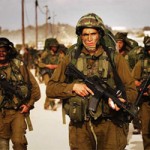Wednesday
Mar252009
A Modest Proposal: Why Hamas May Move Towards a Settlement with Israel
 Wednesday, March 25, 2009 at 7:56
Wednesday, March 25, 2009 at 7:56 
More than two months after the unilateral ceasefires in the Gaza War, there has been little progress in discussions on Israel and Palestine. Not only have unity talks between Fatah and Hamas failed to reach a conclusion, but the Israeli-Hamas talks on a prisoner exchange have also been fruitless.
So what's the hold-up? Self-confidence. Hamas self-confidence.
According to all measurements, Hamas's popularity has been increasing, even in the West Bank, since the end of the war. Surviving the border blockade of Gaza and the heavy bombardments of Operation Cast Lead Hamas has strengthened its position in Gaza, as it has put out a constant anti-Fatah rhetoric.
In the unity talks to establish the pre-conditions for an election to form a unity government, the Palestinian Authority (dominated by Fatah) has been insisting on the principles of the Quartet of the US/UN/EU/Russia. These call for Hamas to renounce terrorism, recognise Israel, and abide by the 2005 agreement between Tel Aviv and the PA. Hamas does not and cannot accept this for the time being.
Despite its stronger position, Hamas is walking on a thin and fragile tightrope: it must either accept the Quartet's conditions and work in partnership with Fatah, or it will be excluded from the political arena and be increasingly marginalised. If the Obama Administration's regional policies move the new Israeli Government, because of deepening economic crisis or a resurgence in perception of Israeli "security" in US domestic politics, Hamas can lose everything it has now.
Hamas is putting its bargaining power on the line. It may get more concessions from Israel at the behest of the US over the course of time. However, even this will never allow Hamas to sustain its uncompromising stance against recognition of Israel and acceptance of the 2005 agreements.
What does this mean? Hamas officials, who are aware of this dilemma, will not insist on political principles that can never be fulfilled. As they gain more of a role in a Palestinian Government, encouraged by their showing in the next elections, they are going to recognize Israel.
This will probably take years. At first, a long-term truce (hudna) based on pre-1967 borders and some economic, political, environmental, and security cooperation will be established. That in turn may establish the platform for a long-standing peace agreement in the following years.
Those who are sceptical should look back to early 2006, just before Hamas's triumph in the Gaza elections. On 4 March, Hamas leader Moussa Abu Marzouk stated that recognition of Israel would be a rejection of the rights of Palestinians, and other officials claimed during the election campaign that Fatah's 16 years of peace talks with Israel were a waste of time. However, another top official, Mahmoud al-Zahar told CNN in January that a long-term truce was possible if Israel withdrew to pre-1967 borders and released Palestinian prisoners. T
Three years later, Hamas spokesman Ayman Taha has said that the organization is unwilling to recognize Israel and to accept the agreements signed by the PA. Yet, as it manoeuvres in negotiations in Cairo and with Tel Aviv, Hamas has to consider if that position will jeopardise its political future.
In 2006, the US would not recognise Hamas' victory in Gazan elections because it believed that the organisation would be reinforced in its refusal to accept any relationship with Israel. Three years later, Hamas can defy this prediction: establishing and consolidating its gains in a Palestinian Parliament and possibly a Presidency, the Gazan leadership could decide to come in from the political cold. The process would take time and careful language, but acceptance of the Quartet's conditions and a unity government in Palestine are possible. And so, eventually, is a regional peace based on pre-1967 borders with Israel.

 The head of the Fatah delegation in Palestinian reconciliation talks
The head of the Fatah delegation in Palestinian reconciliation talks  As yet more reports, this time from Israeli soldiers and from the United Nations Human Rights Council, document the extent of Israeli abuses and killing of Gazan civilians, Enduring America takes a look back at the Israeli explanations --- and denials --- during the war:
As yet more reports, this time from Israeli soldiers and from the United Nations Human Rights Council, document the extent of Israeli abuses and killing of Gazan civilians, Enduring America takes a look back at the Israeli explanations --- and denials --- during the war:
 Barack Obama has a new admirer.
Barack Obama has a new admirer.